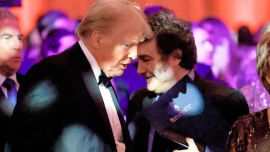In 1973, some years after another of Argentina’s many military dictatorships had come to an end, María Elena Walsh wrote ‘Cómo la Cigarra' (“Like the Cicada”).” The song opens like this: “So many times I was killed, so many times I died / However, I’m here, returning to life / I give thanks for misery and the hand holding a dagger / Because it killed me so wrongly / And I kept on singing…” The song was successful because it was interpreted as the resilience of society in the face of an authoritarian government, and it became even more famous during the last military dictatorship, which started in 1976 and ended in 1983.
The hands holding daggers which intended to kill the Editorial Perfil publishing house, its co-founder Jorge Fontevecchia and, since its creation in 1989, Noticias magazine, have also attempted it badly. And, like María Elena, we thank them for their clumsiness, because rather than killing us, what they always achieved after those failed attempts was to make us stronger. That is why the recent attempt by President Javier Milei to destroy an independent publishing house is not original, nor is criticism from those in power. Many have done it before him.
The last dictatorship did it, when it repeatedly closed down the La Semana magazine (the predecessor of Noticias) and Fontevecchia, its young director, first ended up detained at the El Olimpo clandestine detention centre and was then forced to exile in the United States until the return of democracy.
Former president Carlos Menem’s followers did it too, when Noticias was the medium which had to withstand the most trials from that government (which had) an automatic majority in the Supreme Court, in addition to the consistent threats and bombings at Perfil’s offices. It was during that period that the worst punishment was received: the murder of our photographer José Luis Cabezas, an attack on the only newsroom willing to investigate the Alfredo Yabrán and his mafia.
Kirchnerism did it too, when the reprisals took the form of discrimination. The ruling government’s advertising budget was distributed among almost every other media and this company was barred from access to ruling party sources and the Casa Rosada, and with public attacks against Noticias, Perfil and the founder of this publishing house.
“I get on well with all journalists, except one, Fontevecchia,” Néstor Kirchner once said; “Fontevecchia is worse than [Héctor] Magnetto,” wrote Cristina Fernández de Kirchner in her book. Now with Milei’s supporters – like before, with the dictatorship, Menem and Kirchnerism – a ruling party is on the offensive again.
Yet even though Milei’s objective is the same – the destruction of a medium that does not usually give a honeymoon period to the toughest and most empowered presidents – this time a particular feature is provided by this man himself: violence in discourse and gestures that are very different from any other’s. Milei is the star of this authoritarian advance against those who do not think alike. The other particular feature of this attack by the President is that, even though he seems to put more emphasis on his assaults on Perfil and Noticias, he has also taken aim at many other media and journalists.
Even those who clearly show a positive attitude, but who still confuse the leader of La Libertad Avanza by exercising freedom with some word or tone that the President considers unfit. face aggressions. It is an approach that has already earned him much rejection and calls for reflection from such entities as the National Journalism Academy, FOPEA and ADEPA, among others.
None of that will change someone who, given his nature and strategy, decided to adopt a confrontational stance with social players impacting the culture of a society, including its journalists, intellectuals and artists. Milei’s confrontation comes with similar tools to those of his predecessors: he accuses specific people and uses ruling party communicators to mistreat anyone criticising the Government, installing fear to generate self-censorship.
What is more, as Kirchnerism did, Milei’s government has started to discriminate with the state’s advertising budget over the last few weeks through its decentralised bodies. You can imagine who, once again, will get nothing… the difference is that thanks to the well-known “Perfil case” that went through the courts and led to a sentence against Argentina’s previous government, no-one can commit that crime again. Not, at least, without exposing themselves to a new legal sentence.
At any rate, much to Milei’s regret, this publishing house will still keep going, as it did with all those who attacked it in the past. It will not be easy, because it never has been, and because ruling party pressure arrives in addition to an economic situation affecting all Argentine companies alike.
That being said, the serious thing would not be a repeat of those attacks. The most serious thing would be a society that allows its normalisation, as has already happened in the past.
It would mean not having learnt from our mistakes. It would be to repeat them.
























Comments